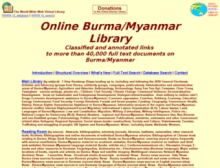Resource information
Paper prepared for presentation at the 2016 WORLD BANK CONFERENCE ON LAND AND POVERTY, The World Bank - Washington DC, March 14-18, 2016
The paper is based on the study on customary tenure for LCG in Chin and Shan States 2013-2015 in brief periods. The relevance of the topic was grounded in a wish to 1) identify statutory means to protect the livelihood of ethnic upland communities in Myanmar from losing, in particular, their shifting cultivation fallow land to agribusiness concessions; 2) based on results from fieldwork, to guide the Government towards recognizing customary (communal) tenure in the drafting of the National Land Use Policy (NLUP) with the ultimate aim of recommending procedures for customary (communal) land registration in a future new Land Law and associated Rules 3); to define how to recognize boundaries of shifting cultivation parcels in a customary system of fair but variable annual local land sharing.
"... In Myanmar land issues are of paramount importance after years of land grabbing by the military and business cronies. A rapid anthropological study 2013-14 in Chin and Shan State for the Land Core Group was carried out to inform the post 2011 government. The study recorded the internal rules of customary communal tenure and identified possible statutory means of protecting untitled land, including fallows, against alienation. The Land Core Group guided the Government Committee during 2014-15 to recognize customary tenure in drafting of the National Land Use Policy, not yet endorsed. The study recommended conversion of the community into a legal entity/organization registering all its agricultural land, while keeping separate and intact its customary internal rules. The study construed a reading of existing regulatory framework in support. The study proved, though, that precise mapping of large tracts of shifting cultivation land is difficult due to annual diversity of fuzzy boundaries...
Key Words: land rights, communal tenure, mapping, land registration, indigenous peoples...



